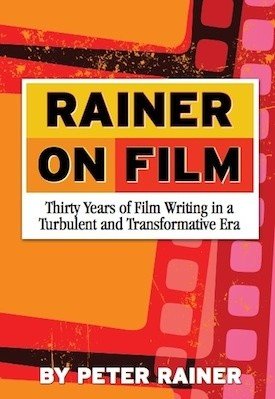Book Review: “Rainer on Film” — Indispensable Movie Criticism
With a good critic like Peter Rainer, the opinion itself is the least interesting part of the review. It’s the contextualizing of the opinion. And the choice of words on paper.
Rainer on Film: Thirty Years of Film Writing in a Turbulent and Transformative Era, by Peter Rainer. Santa Monica Press, 576 pages, $24.95.
By Gerald Peary
Peter Rainer, the excellent film critic for The Christian Science Monitor, and a long-time friend, started, decades ago, the same way as I did, as a teenager obsessed not only with going to movies but with chewing on serious film criticism. Initially, we both had the same review writing heroes, James Agee for the extraordinary posthumous collection, Agee on Film, and Dwight Macdonald for his caustic, snooty, high-culture monthly column in Esquire. But then we went different ways. I was an avowed Sarrisite, entranced by the idiosyncratic lists of essential “auteurist” directors served up by Andrew Sarris in The Village Voice and in his polemical work, The American Cinema. As evident in his newly published collection, Rainer on Film: Thirty Years of Film Writing in a Turbulent and Transformative Era (Santa Monica Press), Rainer fell early under the mighty spell of Pauline (I Lost It at the Movies, Kiss Kiss Bang Bang) Kael, she holding forth at The New Yorker.
How does it translate to have different critic masters? We both wrote with excitement about filmmakers who were approved by the critic we honored and devotedly followed. Sarris gave his hearty endorsement to John Ford, Alfred Hitchcock, Orson Welles, but also to oddities like Nicholas Ray, Budd Boetticher, Douglas Sirk. I likewise embraced the cineastes above. In his book, Rainer writes favorably of Steven Spielberg, Brian De Palma, Bernardo Bertolucci, Sam Peckinpah, Robert Altman, all of whom notably struck a chord with Kael. He endorses movies which Kael adored: Diner, Shoot the Moon, The Makioka Sisters, Something Wild. From what I recall, Kael only had eyes for one documentarian, Frederick Wiseman, and Rainer also swears by Wiseman’s oeuvre.
Rainer was not the only critic so influenced by Kael. There were many in the 1980s and 1990s, the so-called “Paulettes.” The most zealous of the group not only backed the same movies but desperately imitated Kael’s flamboyant writing style, adopting her rhetorical strategies. That’s rarely the case with Rainer, though I did locate one example of pure Kaelese, his utilizing the second person “you” in a way that insinuates that the critic knows exactly how an audience member will read a film. Here goes my pal, Peter, writing, Kael style, on the Steve Martin-starring Roxanne: “It makes you feel mysteriously, unreasonably happy, as if you were watching colors being added to a sunset. The glow from this film stays with you; it has a radiance like no other movie.”
Rainer’s most fervent “Paulette” period was in the 1980s, when, as an impressionable young man not too long out of Brandeis, he was hired by The Los Angeles Herald Examiner. Afterward, doing reviews for The Los Angeles Times, New Times, New York Magazine, he came to a very distinct personal voice. But even early, there was a drastic difference in Rainer’s tone from Kael’s certitude that she was right on about every film, that her brash opinion was actually the correct way to see a movie. In contrast, Rainer has always managed the balancing act of taking the strongest positions in his reviews but conveying these with modesty and reason.
In addition, Rainer is actually capable of changing his mind about his judgments, something Kael, famously, never did. In Rainer on Film, he’s tacked on Postscripts below certain pieces. There he explains, for example, that he’s grown through the years to better appreciate Apocalypse Now.
(Unlike some of Kael’s extreme acolytes, as paranoid and separatist as Tea Party advocates, Rainer is at ease among critics who don’t quite match his aesthetics. Though toiling in an often shrill, cranky, snobby profession, Rainer is recognized as an approachable good guy. It makes total sense that he was elected year after year, endorsed by all sides, as President of the National Society of Film Critics.)
And more: Kael for all her amazing intelligence pushed a kind of macho, anti-intellectual line, having little patience for movies with an ideological agenda or with films too enmeshed in artsy ideas. (Read, for instance, her trashings of Last Year at Marienbad and L’Avventura.) Rainer is an unapologetic intellectual, who revels in seeing brainy movies, and in unraveling them. My friendship with Rainer is partly about cinema, but it’s even more about our shared passion for esoteric books and prowling used book stores. One of the finest sections of Rainer on Film is entitled Literary and Theatrical Adaptations. There are many reviewers who can’t bother to read the book before seeing the movie. Mandarin critics like Rainer are equally engaged by the literary source, and absorbed by the transformations from book or stage to screen.
When Rainer reviews the Robin Williams-starring Seize the Day, he is able to explain why this is the best choice among Saul Bellow novels for a film version. When he reviews Under the Volcano, he can talk authoritatively about what director John Huston sacrificed from the Malcolm Lowry source. Yes, when addressing the Merchant-Ivory The Golden Bowl, Rainer found it his critic duty to push his way through the impossibly lengthy, almost unreadable Henry James tome which inspired it. Rainer, describes very late James as: …an author, whose sensibility for shifts of mood and thought and strategy is so subtle and rarefied as to sometimes seem beyond comprehension.” As for the Golden Bowl adaptation: “The movie brings out the drama in the book by, in effect, making exterior everything that’s interior. This represents almost a rebuke to James’s art.”
Trust Rainer to understand what is wrong with Adrian Lyne’s rendition of Lolita because he’s so attuned to the rightness of Nabokov. Rainer: “What makes the novel such an extraordinary document is how it horrifies when it is so wheedlingly funny. Humbert isn’t just a great tragic figure; he’s a great comic figure too. His lecherous folly for the twelve-year-old Lolita is a parody of passion that turns out to be the real thing.” Rainer notes that the earlier Stanley Kubrick film captured the book’s “rhapsodic, nutbrain ghastliness.” But Lolita done by Lyne? Fatally, “…it’s not that funny.”
A horror of being a staff film critic is what you are forced to write on days (usually the weekend) when no new film is opening: the so-called “think piece.” Most often, this involves squashing together a bunch of recent releases and coming up with some contrived theory about what these have to do with each other—a “trend,” an evolving zeitgeist. For me, some of Rainer’s lesser choices for inclusion in his book are the ones which are the longest and seemingly weightiest, but are warmed-over Sunday essays from long ago. His jewels often are smaller pieces, like a delicious take on the Barbara Kopple documentary about Woody Allen, Wild Man Blues.
Here’s Rainer, so perceptive about Allen’s child-wife, Soon-Yi. “Soon-Yi doesn’t seem to be in awe of Allen, or even turned on to him; she’s more like one of those attentive girl Fridays that powerful men often attract.” And when Woody actually leaves his Upper East Side apartment, heading downtown as a Monday-night jazz musician? “It’s fascinating to watch Allen playing clarinet…because it’s clear that he’s a control freak trying—ever so slightly—to limber up. …As a player, he’s not that bad; to the extent that he can look happy, he even seems vaguely pleased with himself as he tootles before his adoring audiences….But unlike most jazz performers…Allen doesn’t appear to pull anything special from his audience. He’s playing not to them but at them.”
There’s plenty more terrific stuff to peruse in the 500-plus pages of Rainer’s self-selected essays, starting with a delicious section on “Overrated, Underseen.” He’s right about dissing and roasting Good Will Hunting, Shine, and Zero Dark Thirty, and dead wrong in his disdain for Far From Heaven and In the Mood for Love. But, who cares? With a good critic, the opinion itself is the least interesting part of the review. It’s the contextualizing of the opinion. And the choice of words on paper.
Is it clear that The Christian Science Monitor’s Peter Rainer, is a marvelous writer? A first-rate thinker? And Nabokov funny! It’s so rare these days that a publisher is willing to publish a collection of film reviews. With Rainer on Film, thankfully we get a proper sampling of one of America’s finest critics. And for the American public, definitely a bit “underseen.”
Gerald Peary is a professor at Suffolk University, Boston, curator of the Boston University Cinematheque, and the general editor of the “Conversations with Filmmakers” series from the University Press of Mississippi. A critic for the late Boston Phoenix, he is the author of 9 books on cinema, writer-director of the documentary For the Love of Movies: the Story of American Film Criticism, and a featured actor in the 2013 independent narrative Computer Chess.


